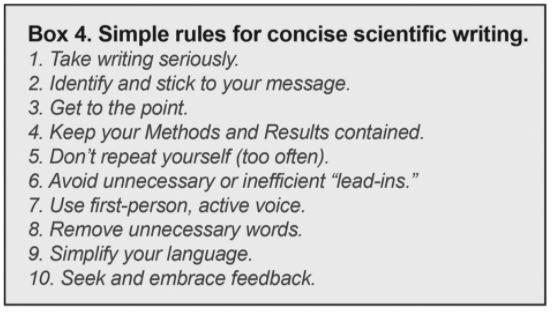To return to the main Resources menu, click here.
- This 1 hour lecture by Kristin Sainani as part of my Sports Biomechanics Lecture Series provides many useful tips and examples for scientific writing:
-
I have also heard very positive reviews of Kristin’s free Writing in the Sciences course.
-
For a great guide to ‘creating logical flow when writing scientific articles’, check out this handy article which provides tips and examples for every section of a paper at a macro and micro level.
-
This article provides ‘some personal advice concerning how to write precise, concise and eloquent research articles’, whereas this paper discusses ten ‘simple rules for concise scientific writing’:
-
Similarly, this paper provides and discusses ’ten simple rules for writing a literature review’.
-
For a more detailed breakdown of writing considerations and sentence structure, I recommend this article on ‘The Science of Scientific Writing’.
-
Finally, Grammarly offer extensions / add-ins for Word, Outlook, etc. which can help with writing style. Just make sure you consider the suggestions carefully and don’t simply accept all suggestions.
After a̶ ̶n̶u̶m̶b̶e̶r̶ ̶o̶f̶ 𝘀𝗲𝘃𝗲𝗿𝗮𝗹 suggestions last week, I installed the @Grammarly add-in for Word (https://t.co/MOa6ANX5Zy).
— Stuart McErlain-Naylor (@biomechstu) February 17, 2021
I'm pleasantly surprised, so thank you for the suggestions.
I've added this to my list of free resources: https://t.co/y9fbbfpRjX pic.twitter.com/sf1zdKiERB
General Writing:
-
For regular tips and examples of general writing, I recommend following Julian Shapiro and David Perell on Twitter.
-
The tweet below contains some examples of Julian Shapiro’s resources, including a 5-page writing handbook aimed at online writing but still useful for other formats:
Writing, punctuation, & mental models
— Stuart McErlain-Naylor (@biomechstu) July 12, 2021
Three great resources from @Julian, providing examples and explanations throughout.
• 5-page writing handbook: https://t.co/7rXyG024YH
• Punctuation guide: https://t.co/9OALrUS7E7
• Guide to using mental models: https://t.co/7gtgFZoFza pic.twitter.com/YFGwrYxOZE
